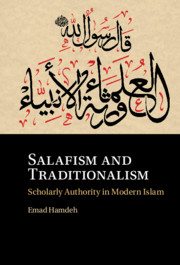Cambridge University Press is
publishing a new book on the history of Islamic scholarship and scholarly
authority in the 20th century, with a focus on Salafism.
ABOUT THE BOOK
One of the most contentious
topics in modern Islam is whether one should adhere to an Islamic legal school
or follow scripture directly. For centuries, Sunni Muslims have practiced Islam
through the framework of the four legal schools. The 20th century, however, witnessed
the rise of individuals who denounced the legal schools, highlighting cases
where they contradict texts from the Qur'ān or Sunna. These differences are
exemplified in the heated debates between the Salafi ḥadīth scholar Muḥammad Nāṣir
al-Dīn al-Albānī and his Traditionalist critics. This book examines the
tensions between Salafis and Traditionalists concerning scholarly authority in
Islam. Emad Hamdeh offers an insider's view of the debates between Salafis and
Traditionalists and their differences regarding the correct method of
interpreting Islam. He provides a detailed analysis of the rise of
Salafism, the impact of the printing press, the role of scholars in textual
interpretation, and the divergent approaches to Islamic law.
ABOUT THE AUTHOR
Emad Hamdeh, Embry-Riddle
University
TABLE OF CONTENTS
Part I. History:
1. Traditionalism and Salafism
2. A controversial Salafi
3. Gatekeepers of knowledge:
self-learning and Islamic expertise
Part II. Islamic Law:
4. Can two opposing opinions be
valid? Legal pluralism in Islam
5. Qur'an and Sunna or the
Madhhabs?
6. The pursuit of authencity:
reevaluating weak Hadith
7. Challenging early Hadith
Scholarship.
More info here


No comments:
Post a Comment